Legal risks of asking for a helping hand on the farm
 © Tim Scrivener
© Tim Scrivener Farmers who call on friends and family to help out on the farm need to make sure they are adequately insured, as they risk an expensive legal claim if something goes wrong.
Suzanne Trask, partner and head of the adult brain injury team at law firm Bolt Burdon Kemp, says that asking friends or family to help out at busy times or accepting offers of help during an emergency is very common, but there can be serious consequences.
If anyone helping out is injured because of safety failings, there is a risk the farm will be legally liable, either because they will be treated as an employee or they were a visitor who the farmer has taken responsibility for.
See also: Staff matters: Change of ownership and skilled worker visas
Farmers drafting in friends isn’t something new, but there may be more acute pressure to do so now because of labour shortages or if people are struggling to justify taking on staff, she says.
“But anyone acting under the direction of the farmer in return for payment may well be considered an employee if something goes badly wrong.”
“I specialise in brain injuries – where someone has suffered a very serious injury and their life has changed forever. When this happens, the law may be more likely to recognise a worker as an employee.”
Ms Trask says that even if helpers are not found to be employees, if there are safety failings that lead to their injury, the farm can still be found liable in a claim to compensate them as a visitor to the premises.
“We know that helping out on a farm can involve inherently high-risk activities, and the farmer [under health and safety law] has an obligation to assess and consider carefully what the risks are and do everything possible to minimise them.”
Businesses need to ensure they have adequate employers’ liability and public liability insurance in place to cover themselves against a possible claim, she says, adding that she has seen awards for life-changing injuries worth more than £20m.
“This is because they need to cover the costs of their essential care for their lifetime, so if the case involves a young person, the award may need to fund care for the next 40-50 years.”
Employers’ liability insurance
David Harrison, farming sector lead at insurance company NFU Mutual, says employers’ liability (EL) insurance covers a farm’s liability towards any employees who sustain a work-related injury or illness.
In the majority of circumstances, EL insurance is a legal requirement in this country, with the main exception being those who employ only family members.
Fines can be issued to businesses that have not taken out cover where they are legally required to.
“Our standard EL cover includes everyone who might be an employee, within the definition, including family members,” he says.
“Excluding a family member from insurance could be one of your biggest regrets, as should anything go wrong, there would be no provision for them if they are injured in circumstances where the insured would be liable as an employer.
“There may also be times that a farmer opts not to take EL cover because they do everything on their own, then falls ill and accepts an offer of help without thinking of the consequences for people on site should the worst happen.”
Practical tips if getting outside help
Evita van Gestel, from NFU Mutual Risk Management Services, says that under health and safety law, people helping out temporarily must legally be protected in the same way that employees would need to be.
“There is potentially even more of a duty of care, as these people may not be wholly familiar with the risks on the farm or may have forgotten if they are not often in that type of environment,” she says.
“Whatever the age group and regardless of your relationship to them, it’s important to take the right steps to protect them.
“They could be young people, who may be higher risk takers and don’t fully understand how to keep themselves safe, or they could be older relatives, who may not be as physically able or agile.
“Informal helpers are possibly not used to the physical aspects of the work involved, which could lead to things such as strains and sprains.”
It might feel weird to do a safety briefing or demonstration on how to do things for people who you know well or have helped you before, but it is essential to:
- Give them all the information they need, including what to do when something goes wrong
- Keep a record to demonstrate how you have informed and instructed people
- Make sure you tell them what they are allowed to do, but also, importantly, what they are not allowed to do (for example, use/drive/operate certain vehicles/machinery/chemicals)
- Invest the time up front and you will save time once you have started the work
- You might not feel you have the time to supervise, but you must.
The Farm Safety Foundation, founded and funded by NFU Mutual, has published a temporary workers guide, Flipbook.
Stephanie Berkeley, Farm Safety Foundation manager, says:
“Many farmers may think that temporary helpers may not be exposed to the same level of risk, but they could be arriving on site with no training or awareness of the severity of risk being presented to them.”
